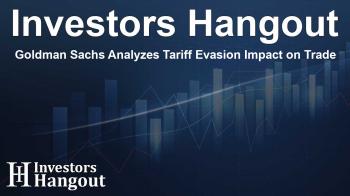Goldman Sachs Analyzes Tariff Evasion Impact on Trade

Goldman Sachs Analyzes Tariff Evasion Impact on Trade
Goldman Sachs recently shed light on the critical issue of tariff evasion. This growing matter is attributed to the noticeable $240 billion decrease in imports from China since the trade war began. The analysts think that this decline in reported imports could be overstated due to the various methods of tariff evasion observed.
Understanding Tariff Evasion
Tariff evasion is primarily characterized by three major tactics. These include routing goods through third-party countries, significantly undervaluing goods, and mislabeling products to benefit from lower tariff rates. Each method plays a unique role in distorting the actual trade data.
Methods of Evasion and Their Implications
When goods are rerouted through bystander nations, it impacts bilateral trade flows effectively. In contrast, undervaluation exerts influence on the overall import figures, whereas mislabeling does not alter the headline statistics but has an indirect effect on the data interpretation by analysts.
The Financial Impacts of Tariff Evasion
Goldman Sachs estimates that in 2023, the rerouting of trade via entrepot markets resulted in around $30-50 billion’s worth of goods. This phenomenon is believed to represent about 20% of the noted decline in U.S. imports from China. Additionally, a significant discrepancy has been observed between U.S.-reported imports and China’s reported exports to the U.S., which has expanded by $150 billion.
Analyzing the Financial Gap
The analysts have specifically attributed around $80 billion of this gap to tariff evasion, divided equally between undervaluation and mislabeling inconsistencies. They suggest that total tariff evasion losses could range from $110 to $130 billion for the year, encompassing entrepot trade, undervaluation, and mislabeling, which altogether reduced the trade deficit with China by approximately $70-90 billion.
Projecting Future Tariff Evasion Trends
Goldman Sachs has extrapolated these insights to forecast the impact of a potential increase in tariffs on Chinese imports and European automobiles. They predict that such developments could further escalate tariff evasion by an additional $125 billion and might contribute to an extra $80 billion decrease in the reported trade deficit between the U.S. and China.
Frequently Asked Questions
What is tariff evasion?
Tariff evasion involves methods used to circumvent tariffs, often leading to inaccurate trade reporting and losses in governmental revenue.
How significant is the impact of tariff evasion on U.S.-China trade?
Goldman Sachs estimates that tariff evasion could account for losses ranging from $110 to $130 billion, significantly reducing the reported trade deficit.
What methods are used for tariff evasion?
The three primary methods are routing goods through third-party countries, undervaluing goods, and mislabeling to access lower tariff rates.
Why are there discrepancies between U.S. and China trade reports?
The discrepancy arises from reporting differences, with Goldman Sachs suggesting that $80 billion of the gap could be due to tariff evasion tactics.
How could future tariffs affect tariff evasion trends?
Increased tariffs are projected to further escalate tariff evasion by $125 billion and lead to a deeper reduction in the U.S.-China trade deficit.
About The Author
Contact Caleb Price privately here. Or send an email with ATTN: Caleb Price as the subject to contact@investorshangout.com.
About Investors Hangout
Investors Hangout is a leading online stock forum for financial discussion and learning, offering a wide range of free tools and resources. It draws in traders of all levels, who exchange market knowledge, investigate trading tactics, and keep an eye on industry developments in real time. Featuring financial articles, stock message boards, quotes, charts, company profiles, and live news updates. Through cooperative learning and a wealth of informational resources, it helps users from novices creating their first portfolios to experts honing their techniques. Join Investors Hangout today: https://investorshangout.com/
The content of this article is based on factual, publicly available information and does not represent legal, financial, or investment advice. Investors Hangout does not offer financial advice, and the author is not a licensed financial advisor. Consult a qualified advisor before making any financial or investment decisions based on this article. This article should not be considered advice to purchase, sell, or hold any securities or other investments. If any of the material provided here is inaccurate, please contact us for corrections.

